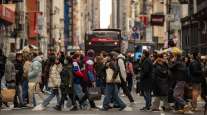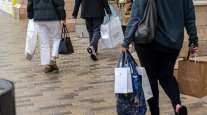Consumer Spending Ends Sluggish Quarter on Positive Note

Consumer spending climbed in March, capping a lackluster first-quarter performance that was enough to keep the U.S. economy from shrinking.
Purchases rose 0.4%, the biggest increase since November, after a 0.2% February gain that was larger than previously estimated, Commerce Department figures showed April 30. The median forecast of 79 economists in a Bloomberg News survey called for a 0.5% increase. Incomes were little changed reflecting a drop in dividend payments.
“Consumer spending in the first quarter as a whole was OK,” Guy Berger, a U.S. economist at RBS Securities Inc. in Stamford, Connecticut, said before the report. “March was hopefully just a down payment on the rebound we’re going to see in the second quarter.”
Economists are counting on household spending to do the heavy lifting in reviving growth after slumps in business investment and exports caused the economy to stagger at the start of 2015. An improving job market and nascent acceleration in wage increases are among reasons such a rebound probably is in the works.
Projections for spending in the Bloomberg survey ranged from gains of 0.2% to 0.7%. The previous month’s reading initially was reported as a 0.1% increase.
The Bloomberg survey median called for incomes to rise 0.2%. The unchanged reading last month followed a 0.4% gain in February that was driven by a jump in dividends.
The report represents the monthly breakdown of data published April 29 that showed consumption climbed at a better-than-expected 1.9% in the first quarter. Still, that was less than half the pace of the prior three months, when spending climbed at the fastest rate since 2006.
The U.S. economy barely grew from January to March, with gross domestic product rising at a 0.2% annual rate and weighed by harsh winter weather and slumps in business investment and exports. GDP advanced 2.2% in the prior quarter, Commerce Department data show.
The Federal Reserve, which is considering raising interest rates for the first time since 2006, said the slowdown during the winter months in part reflects “transitory factors,” according to a statement April 29 after a two-day meeting. “Although growth in output and unemployment slowed during the first quarter, the committee continues to expect that, with appropriate policy accommodation, economic activity will expand at a moderate pace.”
The Fed repeated it will raise rates when it sees further labor-market improvement and is “reasonably confident” inflation will move back to its 2% goal over time.
The report showed the price index tied to consumer spending increased 0.2% in March, the same as in the prior month. From a year earlier, the gauge was up 0.3%. This inflation measure is preferred by Fed policymakers and last met their target in April 2012.
Stripping out the volatile food and energy components, the price measure climbed 0.1% from the month before and 1.3% in the 12 months ended March.
The report also showed that after adjusting for inflation, which generates the figures used to calculate GDP, purchases increased 0.3% last month after being little change in February, which previously was reported as a 0.1% drop.
The gain last month was propelled by a 2% inflation-adjusted increase in durable goods that reflected a rebound in demand for automobiles.
Cheaper gasoline prices have kept some extra money in consumers’ pockets over the past few months. While the average price of a gallon of the fuel rose to $2.56 on April 28 from a low of $2.03 in January, it’s still below last year’s peak of $3.70.
Companies such as Mastercard Inc., the second-largest payments network, also are feeling the effects of lower gas prices. While payment credit-card spending accelerated outside the United States, domestic consumers seem to be using spare cash from cheaper gas to pay down debt and prop up personal savings, and “we don’t get any benefit out of a higher savings rate,” MasterCard CEO Ajay Banga said.
However, it doesn’t appear to be a long-term issue, he added. “I think we’re going to look at a somewhat different pattern of consumer spending over the next three to six months just because underlying consumer sentiment is positive.”
Expenditures on services were little changed after adjusting for inflation, the figures showed. The category, which tourism, legal help, health care and personal care items such as haircuts, is typically difficult for the government to estimate accurately until more information is available in later months.
Disposable income, or money left over after taxes, fell 0.2% in March from the prior month after adjusting for inflation, the weakest performance since December 2013. It was up 3.3% over the past year. The saving rate decreased to 5.3% from 5.7% in February.
Continued job gains will be needed to support consumer spending in the months to come. Payrolls climbed by 126,000 in March, the weakest since December 2013, after 12 straight months of gains greater than 200,000, according to Labor Department data.
Wages and salaries in the nation rose at a faster pace in the first quarter, another report showed April 30. Worker pay climbed 0.7% in the three months through March after a 0.6% advance in the third quarter, according to the Labor Department’s employment cost index.
Another Labor Department report showed firings dropped to the lowest level in 15 years. The number of Americans filing claims for unemployment benefits declined by 34,000 to 262,000 in the week ended April 25, the fewest since April 2000.
“Although growth in output and employment slowed during the first quarter, the committee continues to expect that, with appropriate policy accommodation, economic activity will expand at a moderate pace,” the Fed said in its April 28 statement.




